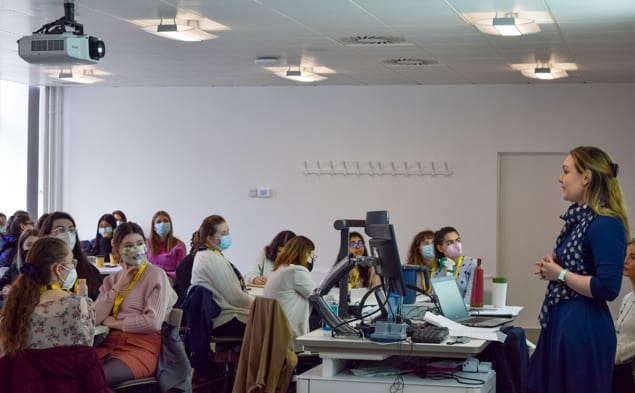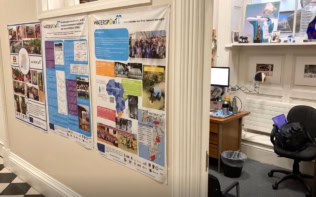Caroline Müllenbroich and Sarah Croke describe how they supported under-represented groups at this year’s Conference for Undergraduate Women and Non-binary Physicists

As we turned around in our lecture theatre seats during a session at this year’s Conference for Undergraduate Women and Non-binary Physicists (CUWiP) one thing struck us: physics is for everyone. Irrespective of gender, ethnicity, religious faith or socioeconomic background, studying physics satisfies a curiosity that is fundamental to understanding the world. A physics education not only fulfils this but also cultivates inquisitive mindsets, encourages critical thinking and problem solving, and opens doors to exciting and diverse careers.
Yet frustratingly, physics is still heavily dominated by white hetero cis men. Traditionally under-represented groups have a hard time claiming their space. While varying levels of aptitudes or interests have been widely debunked as reasons for the disparity in participation, there are many reasons for it. This includes a shortage of qualified and inspirational physics teachers; harmful social gender stereotypes and unconscious bias in schools and society; absence of mentors and role models; and a lack of belonging.
CUWiP showcases inspirational women and non-binary physicists, highlighting exciting career opportunities and, of course, providing professional and social networking opportunities. It creates a much-needed space for minoritized undergraduate students to combat the feeling of isolation or alienation, to foster a sense of belonging, as well as bolster confidence in their capabilities to succeed, and remove the limits of their aspirations by simply re-igniting an enjoyment of physics.
Physics for all
When planning the three-day conference, which was jointly held at the universities of Glasgow and Strathclyde in April, we wanted it to be diverse, inclusive and accessible. Our campaign therefore contained several key elements to reach the widest possible audience for the conference. This included fostering strategic partnerships as well as deliberately inclusive messaging and targeted advertisements to traditionally under-represented groups. We also made sure that our application procedure did not require applicants to demonstrate “ambition” or “excellence”. Instead, we asked how they would benefit from attending. This personal statement together with only a graduation year and demographic data was used to select the 100 participants for CUWiP.
We joined forces with the Blackett Lab Family, a collective of UK-based Black physicists, to reach Black students and deliver a panel discussion to explore “intersectionality” – a term that refers to the interconnected and overlapping nature of all factors that apply to an individual – and how one can bring their whole self into a physics environment. They also put us in touch with a member interested in serving remotely on what was at the time an entirely white organization committee. We got in touch with Pride in STEM, a UK charity for LGBTQIA+ in science, where we were given a long list of speakers as well as travel support for one of our keynote speakers.
Intersectionality allows us to understand how different aspects of an individual’s identity combine to create different forms and levels of discrimination or privilege. Non-binary physicists and trans women were explicitly encouraged to apply – a message that was strengthened by consistent use of pronouns and inspirational LGBTQ+ speakers and panellists. In acknowledgement of intersectionality, we therefore ringfenced applications from trans women and Black students.
Inclusive messaging is important to create a safe space where traditionally marginalized backgrounds, identities and demographics feel confident and welcome to take part. We put an enforceable code of conduct in place, which defined how participants were expected to behave and a mechanism for reporting breaches. We were very clear about the minimal costs of participation at CUWiP to ensure that students from socioeconomically deprived areas could afford to come, and allowed delegates to apply for additional travel funds. Participants observing Ramadan were accommodated by providing a meal before dawn, for example. Taking all questions for panels and talks through an online system such as Slido also reduced potential barriers to participation during the event.
The atmosphere over the three days was buzzing with excitement, passion and a sense of community.
For those with disabilities and mental-health concerns there is simply no “one size fits all” approach. The many challenges faced by people with disabilities can only be tackled if appropriate support structures are in place. By removing barriers to participation, we ensured that people with disabilities could fully participate but that requires increased awareness as a minimum first step.
We experienced various requests for accessibility to CUWiP and offered solutions including taxi coupons to commute between conference venues for participants with reduced mobilities, as well as offers of mobility scooters, additional accommodation and conference capacity for carers to accompany participants, and large print information. Undoubtedly, restrictions during the pandemic have led to limited travel by students and we found that generally there was a high level of anxiety ahead of the conference. We frequently obtained requests for early communication of venues, transportations methods, maps and any further information on accommodation, quiet spaces to decompress and water fountains. Why we need to keep talking about equality in physics
Following these considerations, CUWiP Glasgow had one of the most diverse cohorts of participants of any CUWiP conference, and the atmosphere over the three days was buzzing with excitement, passion and a sense of community. It is well documented that individuals from minoritized groups are more likely to experience impostor syndrome and a reduced sense of belonging, an effect that can be compounded by intersectional inequalities. Such strategies are therefore vital to counteract these effects to attract and retain a diverse range of people to our field.
We are grateful to the organizations that shared their expertise, experience and networks, and to all CUWiP presenters, organizers and participants who could bring their whole selves to Glasgow. We feel inspired by their passion and compassion, and are optimistic for the future. By sharing our experience, we hope we can in turn lower the barrier for organizers seeking to embed inclusion in future events.




